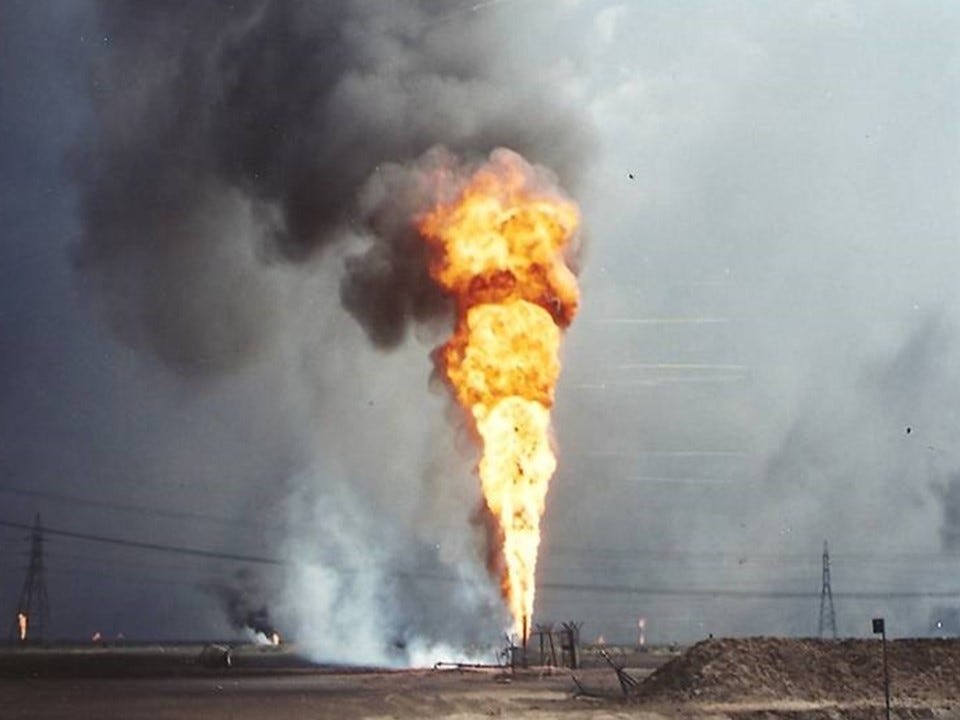Fateful Words That I Have Known.
Ten stories that lead with their punchline. History's first draft is mostly small talk.
“War has priced itself out of the marketplace.”
The oil minister of Kuwait, speaking at a conference in Tokyo, spring, 1990. Possibly the high water mark of our post-Berlin Wall, collapse of Communism, “it’s free markets all the way down” delusions.1 That August, Iraq invaded his country, setting off the U.S.-led engagement known as Desert Storm. War was back!
The presence of U.S. troops on the holy soil of Saudi Arabia inspired Osama bin Laden to start Al-Qaeda, which in turn carried out the most extreme low cost/high impact attack in history, 9/11. War very much priced itself back in, and we’re still dealing with that.
“At current rates of production, we have oil reserves that will last 750 years. This may sound good, but - does anyone think we will still be using oil in 750 years?”
Same guy, same conference. Saddam Hussein damaged 80% of Kuwait’s oil facilities while retreating from the country, and caused an ecological catastrophe by burning or spewing oil at a rate of two to three times Kuwait’s prewar production levels.2
This blew out the oil pressure in Kuwait’s reserves, making it more expensive and difficult to retrieve the oil. At current production rates, Kuwait has about 100 years of reserves - does anyone think we will still be using oil in 100 years?3
“You know why I don’t come to your class? There are too many stupid people.”
This one has sentimental value. I heard it in the town bar of the small but mighty Midwestern college where I was an undergrad. The speaker, a friend of mine, had been indulging there for some time, and decided to address the philosophy professor whose Existentialism class he was notoriously ghosting.
15 minutes later, he ordered a flaming shot of grain alcohol; that’s 180 proof liquor to which a lit match was touched. You downed it fast, and the blue flame extinguished in your mouth, fulfilling the purpose of a vile tasting beverage with exceptional visuals. Thing was, Ralph missed his own mouth, and in full view of the prof momentarily set his lower face and neck on fire (with nothing to kindle the flame burns out fast, but it sure looks freaky.)
One rarely hears, and sees, an argument lost so poignantly. The professor stayed remarkably silent throughout.
“The price? We’ll think about that later.”
A French telecommunications executive, circa 2000. People talk about the Internet bubble, but the real damage came from a telecom bubble, brought on by a U.S. deregulation act that resulted in some interesting projects, and lots of wild spending around the world.
Before (spoiler alert!) this bubble burst, in current dollars there was about $1 trillion spent on infrastructure, cables, satellites, wireless spectrum, licenses, and other stuff. Whatever Pets.com spent, it was a rounding error against these optimistic investments.
So, in early 2000 I got curious about the business plans accompanying all this capital expenditure, and how these companies thought they’d earn back what they’d spent. I spoke with someone whose company had just won a big wireless spectrum auction. He described how they could now send customers an instant video replay of their favorite soccer team’s latest goal, in real time. I asked him what that “football fan” scenario would cost, in terms of rights, gear, spectrum, etc., how many customers they expected to sign up, and what price they’d charge for the service.
A few moments ago you read his reply.
When most of the business plans turned out to be wildly mispriced, the markets and economy spent years absorbing the $1 trillion bet. In 2018, the tech-heavy NASDAQ again gained its 2000 high.
I hate to say it, but when I look at today’s capital outlays for Artificial Intelligence technology, and how poorly the business plans so far connect to a product customers want, at a price they’ll pay, it’s easy for me to have a Telecom Bubble vibe.4
“We are the nimble mammals, dancing around the feet of the dying dinosaurs.”
A San Francisco startup techie, a few months before I talked with the French businessman. What the Internet bubble lacked in economic magnitude, it more than made up for in chutzpah. Thank goodness that’s no longer a feature in tech.5
“You ask good questions.”
Léo Apotheker, chief executive of Hewlett Packard, March 2011. HP was a great company, but it had become so successful that several of its divisions, including printers, personal computers, and computer servers were giant individual businesses. When we spoke, he was struggling to bring the company into the era of cloud computing, open source software, big data, and lower profit margins. How, I asked, did he plan to make the heads of his big divisions cooperate and make shared sacrifices, when they were each effectively CEOs of multibillion-dollar companies?
After a long pause, he responded as you read above. His tenure ended six months later, after a 22-month run that saw the stock fall about 40%. He was paid about $13 million. His successor, Meg Whitman, merged a couple of divisions and busted them out as separate companies, which raised the stock price by 300% from its low. She laid off 70,000 people and talked about returning shareholder value.
“It’s alright - I can still fly!”
Mexico, 1981. I was enjoying the sun and a cold one under a palapa. The gentleman at the next table had gotten there before me, and was well into the “oversharing” stage of his afternoon. He was talking, eventually quite tearfully, about his mother: How she’d browbeaten him never to be a coward, how he’d been scared of flying and so she forced him to become a pilot. God, he hated it, the memory brought tears.
This was all very sad-making, until it became terrifying. The woman behind the bar came over and showed him the time. Shocked it was so late, he got up quickly and launched himself onto the beach, stumbling backwards several times before righting himself. Then he smiled, said his memorable sentence, and went to the airport to do his job.
I left town by car.6
“The problem with owning a G-IV is, by the time you can afford one, you know someone with a G-V.”
Seattle, 1999. I was in town to meet Nelson Mandela, one of the few people I’ve met with authentic charisma. It really is a thing, I’ve witnessed it.
He was in town as the guest of Craig McCaw, a billionaire in love with aviation, who’d flown Mandela over on his private jet. Joburg to Seattle, with a refueling stop in the Canary Isles - this is why you want to own a Gulfstream jet.
I was waiting for Mandela and McCaw on the tarmac at Boeing field, and fell into small talk with one of the executives McCaw had made very wealthy. We started discussing owning a private aircraft, and the big drawback to possessing a Gulfstream 4, or G-IV, the lower-priced executive jet.
Wherever you end up in America, competitive consumption is forever.
9. “We’re still friends.”
Johannesburg, 2010. I was in South Africa to do a story on technology across the continent, and I was visiting the country headquarters of a large wireless telecommunications firm. I was interested in the effects wireless communications were having on the country.
It was a great story; there were innovations in mobile applications, new markets opening up, prepaid calling cards becoming a form of currency, and all sorts of unintended consequences. For a while you could map troop movements in the Congo wars by a spike in prepaid card sales - portable capital, often denominated in dollars. It was entrepreneurship on a continent-wide scale, down to a man in a rural area who owned a tall tree. He charged people to climb it, and from the platform on top they could get a reliable signal.
As we were discussing all of the changes, I noticed that the executive’s desk computer had a screen saver photo of an ugly office building with a large hole blown through the middle, burn marks all around.
This was the phone company’s country headquarters in Kinshasa, the capital of the Democratic Republic of the Congo. During one of the periodic coup attempts, the army had pulled a tank up to the building and, thinking a rebel leader was holed up inside, had lobbed a shell into the fifth floor.
But it was okay, he told me, the company and the government remained on positive terms.
How much profit, I wondered, do you have to be making in a country for something like that to be cool with your big phone company?
He also had me note that the army had aimed well above the first two floors, where the switching rooms were. “If they’d knocked out the phone service, their wives would have killed them,” he said.
“You know who I am, but I don’t know who you are.”
Speaking of charisma…
New York, 1980, where I worked four to midnight at the old Doubleday bookshop on Fifth Avenue. It was a great gig, since New York after midnight was underpopulated, but there was still lots of interesting stuff going on. Additionally, many actors and restless celebrities, the people who keep weird hours, would often drop through in the hours before closing. I think they were often browsing, trying to get away from themselves a bit.
One day Muhammad Ali walked in. Ali had charisma to burn, and when he entered the room went silent. People who couldn’t see him still felt the vibe. Ali must have been used to this kind of thing; he walked over to the register, stuck out his hand, and said to the cashier the words above.
This is still the best comment on Celebrity I have ever heard.
Francis Fukuyama wrote the essay that became the book, “The End of History and the Last Man” a few months before the Berlin Wall fell. People misread this comment on the end of a certain Hegelian method of historical analysis, and assumed it meant there would be no history thereafter, that we were entering a period of consensus linear improvement. Thirty-six years later, it’s pretty safe to say this is not the case. I prefer my anecdote, because the Oil Minister was not being theoretical about things.
Theories about why Saddam did this include: He was punishing the royal family, who’s oil overproduction had lowered prices and hurt his economy, and he was creating a blanket of smoke and rows of fire trenches, blocking the enemy advance and giving what was left of his army a means of escape.
Yes, they do.
On the other hand, after the bust lots of telecom assets got really cheap, and young companies like Google bought them up, which benefited them for years. The same could happen with unused data centers, and new young companies in 2028.
Note to the reader: The author is kidding.
The New Curiosity Shop firmly believes that alcohol and air do not mix, but in full disclosure, the only flight I was ever on where I saw the pilot drinking was also the only flight I’ve ever been on where we lost an engine. He trimmed the tail, righted and turned the craft, and landed us expertly on one good propeller, while the other turned listlessly in the wind. FYI, that is uncomfortable. Particular when there’s a plane load of people trying to act totally cool, and a little kid yells, “Mommy, the fan stopped!”









no3.
also, your presence in this world consoles me.
I enjoyed this walk down memory lane.